We visited China Sunsine’s 3 key production facilities in Shan County, Dingtao County and Weifang City in the Shandong province as well as the recently-completed Guangshun heating plant in Shan County.
Production facilities are currently running at full capacity - We understand that, as of 2Q14 and 3Q14, China Sunsine’s production facilities are running at full capacity due to the recent supply shortage of rubber additives.
We take comfort in the fact that China Sunsine has proper wastewater treatment in place - The Shan County production facility has in-house wastewater treatment capabilities that reduce COD (Chemical Oxygen Demand, a total measure of all chemicals in the water) to <60mg/L (Grade 1B standard) before it is discharged into rivers. The Weifang facility pre-treats wastewater to <2000mg/L and has commissioned a third-party company, to further treat the wastewater to the required standard. The Dingtao facility does not generate wastewater during its production of insoluble sulphur.
The newly-completed Guangshun heating plant is in trial production - The group has invested c.Rmb150m in the Guangshun heating plant. The investment is expected to have a payback period of 7 years and Sunsine will benefit from the reduction of electricity cost. We estimate that, once in full operation, the Guangshun heating plant will save the group Rmb25m-30m in electricity expenses per annum.
The group still has land space reserved for future expansion - For its Shan County plant, the group has a long-term target to increase its production capacity of 6PPD (anti-oxidant) from the current 30k tonnes p.a. to 60k tonnes p.a. The Dingtao plant could potentially increase its production capacity of insoluble sulphur from the current 10k tonnes p.a. to 60k tonnes p.a. The Weifang plant also has spare land space that could accommodate an additional 20k production capacity of rubber additives. Management estimates that Sunsine comprises 15-16% of the total global production capacity for rubber accelerators.
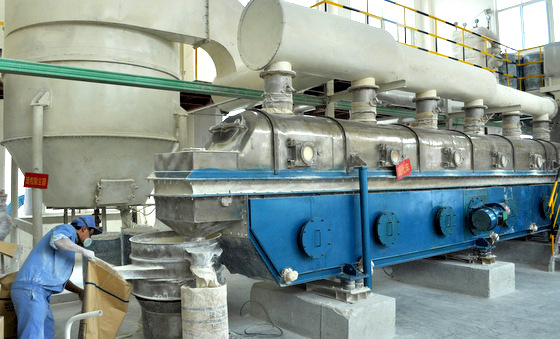 @ Weifang plant where China Sunsine produces rubber accelerators. Photo by Leong Chan Teik
@ Weifang plant where China Sunsine produces rubber accelerators. Photo by Leong Chan Teik
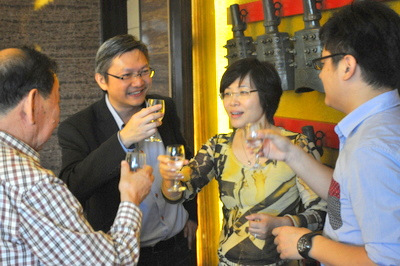 @ lunch during a visit last week (L-R): China Sunsine executive chairman Xu Cheng Qiu; Independent Director Koh Choon Kong; Investor Relations Manager Jennie Liu; and Financial Controller Tong Yiping. Photo by Leong Chan TeikRubber accelerator market: heaven and hell
@ lunch during a visit last week (L-R): China Sunsine executive chairman Xu Cheng Qiu; Independent Director Koh Choon Kong; Investor Relations Manager Jennie Liu; and Financial Controller Tong Yiping. Photo by Leong Chan TeikRubber accelerator market: heaven and hell
China Sunsine is a prime beneficiary of China’s tightening environmental protection laws and regulations. This is in contrast to some of its competitors, which have lost market share in this round of policy-tightening. We believe Sunsine could take this opportunity to snatch market share from its competitors or even capitalise on the industry consolidation through M&A.
Since the second half of 2013, a number of rubber additives manufacturers have been forced to suspend operations due to their failure to comply with China’s increasingly-stringent environmental protection regulations. Several of China Sunsine’s major competitors, including Northeast Auxiliary Chemical Industry (东北助剂) and Tianjin No.1 Organic Chemical Plant (天津市一化化工), have been affected:
The scandal surrounding Northeast Auxiliary Chemical Industry’s waste discharge: http://finance.china.com.cn/industry/energy/special/dbzj/20130912/1808500.shtml
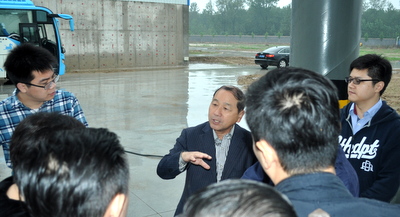 China Sunsine CEO Liu Jing Fu fielding questions during visit to newly-completed Guangshun plant which produces steam and electricity. Photo by Leong Chan TeikThe issue is mainly related to the production of MBT, a highly-pollutive intermediate in the production of some major accelerator products. As more MBT production capacity has been suspended, the market is experiencing a severe supply shortage of the chemical. As a result, the selling price of some major rubber accelerators has surged 20-30%. Some market experts believe the situation is likely to persist into 2015 and that some small producers may even have difficulty resuming productions.
China Sunsine CEO Liu Jing Fu fielding questions during visit to newly-completed Guangshun plant which produces steam and electricity. Photo by Leong Chan TeikThe issue is mainly related to the production of MBT, a highly-pollutive intermediate in the production of some major accelerator products. As more MBT production capacity has been suspended, the market is experiencing a severe supply shortage of the chemical. As a result, the selling price of some major rubber accelerators has surged 20-30%. Some market experts believe the situation is likely to persist into 2015 and that some small producers may even have difficulty resuming productions.
VALUATION Possible valuation range
Historically, China Sunsine has traded at an average forward P/E of 5.95x. We estimate that China Sunsine’s net profit could reach Rmb177m in CY14 and normalise slightly to Rmb164m in CY15 as we factor in higher operating costs and potentially lower selling prices as the market supply of rubber accelerators recovers. Our net profit estimates translate into CY14 EPS of 7.9 S cts and CY15 EPS of 7.3 S cts, respectively. Pegging to CY15 P/E of 5.95x, Sunsine could be worth S$0.435.
A more aggressive valuation
China Sunsine could be worth S$0.65 if we peg its valuation to its peers’ average of 8.9x CY15 P/E (including both rubber chemical and tyre companies). It is worth noting that its direct comparable, Shandong Yanggu Huatai Chemical, is trading at a much higher valuation of 28.3x CY15 P/E.
|
RISKS
Business affected by global economy and tyre industry
China Sunsine’s products are sold to both domestic and overseas tyre manufacturers. Hence, the demand for its products is dependent on the continuous growth of the tyre industry. Should the tyre industry suffer a significant downturn, the group’s business and profitability could be adversely affected.
Fluctuation of raw material prices may affect its profitability
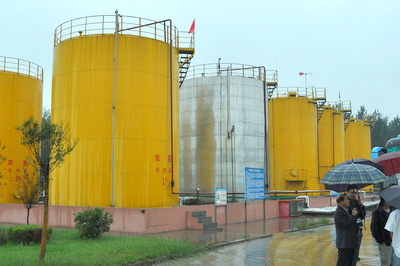 @ Shanxian plant: Storage tanks for raw materials, such as aniline, which are used in the production of rubber accelerators. @ Shanxian plant: Storage tanks for raw materials, such as aniline, which are used in the production of rubber accelerators.
Photo by Leong Chan Teik.China Sunsine’s gross profit margin is influenced by the price of raw materials, including aniline, cychohexylamine, morpholine and carbon disulphide. These raw materials form over 80% of the company’s direct production cost. In particular, aniline makes up over 50% of the total production cost. In the event there are substantial price increases in the raw materials and the company fails to pass on the increase to its customers, its business will be adversely affected.
Subject to environmental protection and safety laws and regulations of China
While the group’s operations have not been affected by the tightening regulations so far given its adequate implementation of environmental protection standards, there is no assurance that more stringent requirements will not be imposed by the relevant PRC regulatory authorities in the future.
The company may incur significant additional capital expenditure in order to comply with such requirements. Should the company fail to comply with any such requirements, its operations may be adversely affected.
Potential increase in competition
The higher profitability as a result of the near-term supply shortage of rubber accelerators might attract new entrants to the market. In addition, the higher profitability may incentivise some small producers to produce illegally and form an underground market. Should such events happen, the group may be forced to lower prices, negatively affecting its profitability.
|
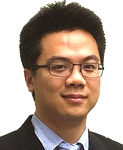 CIMB analysts: Roy Chen (left) & William Tng, CFA
CIMB analysts: Roy Chen (left) & William Tng, CFA @ Weifang plant where China Sunsine produces rubber accelerators. Photo by Leong Chan Teik
@ Weifang plant where China Sunsine produces rubber accelerators. Photo by Leong Chan Teik @ lunch during a visit last week (L-R): China Sunsine executive chairman Xu Cheng Qiu; Independent Director Koh Choon Kong; Investor Relations Manager Jennie Liu; and Financial Controller Tong Yiping. Photo by Leong Chan TeikRubber accelerator market: heaven and hell
@ lunch during a visit last week (L-R): China Sunsine executive chairman Xu Cheng Qiu; Independent Director Koh Choon Kong; Investor Relations Manager Jennie Liu; and Financial Controller Tong Yiping. Photo by Leong Chan TeikRubber accelerator market: heaven and hell China Sunsine CEO Liu Jing Fu fielding questions during visit to newly-completed Guangshun plant which produces steam and electricity. Photo by Leong Chan TeikThe issue is mainly related to the production of MBT, a highly-pollutive intermediate in the production of some major accelerator products. As more MBT production capacity has been suspended, the market is experiencing a severe supply shortage of the chemical. As a result, the selling price of some major rubber accelerators has surged 20-30%. Some market experts believe the situation is likely to persist into 2015 and that some small producers may even have difficulty resuming productions.
China Sunsine CEO Liu Jing Fu fielding questions during visit to newly-completed Guangshun plant which produces steam and electricity. Photo by Leong Chan TeikThe issue is mainly related to the production of MBT, a highly-pollutive intermediate in the production of some major accelerator products. As more MBT production capacity has been suspended, the market is experiencing a severe supply shortage of the chemical. As a result, the selling price of some major rubber accelerators has surged 20-30%. Some market experts believe the situation is likely to persist into 2015 and that some small producers may even have difficulty resuming productions.






